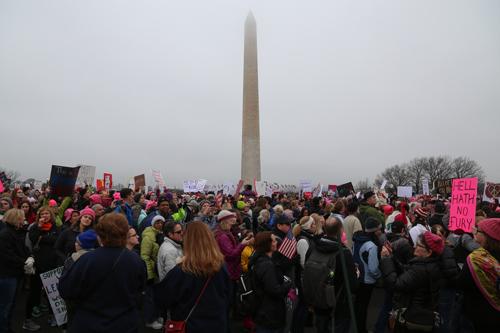
This post was written by reporters Cayla Harris, Leah Potter and Meredith Roaten.
A sea of pink hats and protest signs flooded Independence Avenue and the National Mall Saturday as people from all over the country attended the Women’s March on Washington.
The event, just blocks from the University, drew at least half a million marchers, about three times as many as attended President Donald Trump’s inauguration Friday.
Activists Tamika Mallory, Bob Bland, Carmen Perez and Linda Sarsour began organizing the march after the election as a way to tell the Trump administration on their first day that women’s rights are human rights, according to the march’s website.
The event began at 10 a.m. with a rally that included speeches and performances from politicians like Sen. Kamala Harris, D-Calif., civil rights leaders like Angela Davis and Gloria Steinem and musical artists like Janelle Monáe.
Several celebrities also spoke or performed during the rally, including Scarlett Johansson, Alicia Keys and Madonna.
Actress America Ferrera, spoke to the crowd as the chair of the Artists Table of the march, and said that with the new Trump administration, it is harder than ever to be both a woman and an immigrant in the U.S.
“Our dignity, our character, our rights, have all been under attack, and a platform of hate and division assumed power yesterday,” Ferreira said. “But the president is not America. His cabinet is not America. Congress is not America. We are America, and we are here to stay.”
Protester Fran Oropeza said that she enjoyed the the speakers so much that it was difficult to pick one that stood out.
“Sophie [Cruz], the Hispanic young woman, spoke to the other children about being safe and not to worry because people would have their back and have her back, and it was just beautiful,” Oropeza said.
Protesters on Independence Avenue appeared in all shapes, sizes, ages and colors, but many attended for the same reasons: to discuss concerns about President Donald Trump’s new administration and promote equality.
Claire Utendorf, a 17-year-old student from Leesburg, Va., said she traveled to D.C. to show the new president that women are “powerful and have a voice against him.” Holding a sign saying, “Our minds, our bodies, our power,” she also said that the event would be of historical significance, especially because of its calm nature.
“I’m just so happy that it’s so peaceful,” she said. “This is the definition of peaceful protesting, and it’s making me really happy.”
Janet, a marcher who declined to give her last name, was participating in a march for the first time.
“It’s never too late,” Janet said. “I’m 67 years old, and this is the first time I’ve ever done anything like this.”
Janet said that the high number of marchers was unexpected, especially compared to Friday’s inauguration ceremony turnout.
“I’m just totally blown away by the number of people that are here today, compared to the number of people that were not here yesterday.” Janet said. “I think that says a lot. Only a third of America supports him, the polls are so low, so I think this is going to gain momentum.”
Many women attended to protest Trump, whose administration they fear will infringe upon their lines of work.
Emme Bruns, a scientist from Charlottesville, Va., said she doesn’t support the new president’s agenda and the march showed that she is not alone in her apprehension.
“I’m deeply concerned about the direction that he’s taking the country in terms of climate change,” Bruns said. “I think we’re walking back on science.”
Sarah Miner, a nurse from Rochester, N.Y., said she is an advocate for the Affordable Care Act and attended the march to bring attention to “safe and efficient” health care. But the march focused on much more than her concerns, she added.
“I think what’s great about this march is a lot of people are out here, there are a lot of issues, and what we have in common is that we’re supporting each other,” Miner said. “All of it comes down to human rights, and sort of what we all believe we deserve as a country in a society.”
For some, the march also promoted sentiments of safety and belonging.
Oliver Hackett, 20, drove from Novi, Mich. to march for his niece, sister and mom – but also for himself, as a young transgender person.
“Equality is something we unfortunately still have to fight for, but we’re stronger in numbers, we need to be able to stand up and get together,” he said. “It’s a constitutional right that we’re able to do this and I’m very thankful that everyone came out.”
But while the march promoted inclusiveness and drew mass attention, the work of the people isn’t finished just yet, Hackett said.
“This isn’t the only thing that we need to do; It’s not just one time,” he said. “We need to go out and we need to speak out against injustice. We need to speak out against all the things that we believe in as a country. It’s on us. History’s watching.”
Throughout the crowd, chants rang out of “Not my president” and “This is what democracy looks like.” But as protesters neared the White House, the final stop on the Women’s March itinerary, one chant lasted just a bit longer than the others: “We will not go away. Welcome to your first day.”






